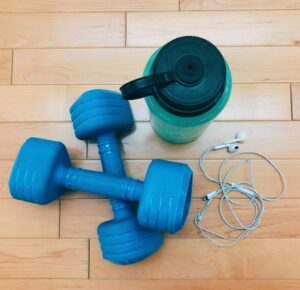
My Journey with IBS: Successes and Mistakes
Talking about bowels on the internet? Not the most glamorous thing. But someone I consider a mentor challenged me for being too superficial on my blog thus far, so I figured I would give this taboo discussion of bowels a go. IBS is something I have struggled with for many years and is a topic I have managed to learn a decent amount of information about through my challenges and triumphs. If I can help at least one reader with my story and my strategies, then the vulnerability of this post will be well worth every word.
So let’s dive right into the world of bloating, cramping, gas and dare I say it on this internet platform…. poop.
IBS: Irritable Bowel Syndrome. It is the most common gastrointestinal (GI) disorder and has a worldwide prevalence of 10-15% (not including the many undocumented patients who never visit a physician about their GI problems). In the United States IBS affects somewhere between 25 and 45 million people, ⅔ of which are female. At the least, one can take comfort knowing that they are not alone.
What is IBS? It entails exactly what the disease is named after: irritable bowels. People with IBS experience frequent abdominal pain, cramping, bloating, and bouts of constipation, urgent diarrhea, or fluctuation between both extremes. It is quite unpredictable and symptoms are often amplified by food sensitivities and stress. It can be extremely isolating and disruptive to daily living. Put more simply, it kind of sucks!
Maybe you’re reading these symptoms and feeling as if you’ve experienced similar things, perhaps you have been formally diagnosed with a gastrointestinal disorder, or (seemingly less likely) this does not pertain to you at all but you would like to have a good chuckle at the adventure my digestive system and I have been on together. Regardless, I hope this post can be helpful. If this isn’t your type of thing, no worries you don’t need to continue reading. Before I can share where I have found success during my IBS journey, it’s important to start with the emergence of my gastrointestinal issues and the many many many mistakes I have made in attempting to mitigate IBS symptoms.
So here we go, things are about to get personal. And yes permission to laugh, pity, relate, cringe, etc. is granted.
An Adventure:
7th grade- Have You Ever Been Told You are Quite Literally Full of Sh*t?
 In the 7th grade I came down with a pretty bad case of pneumonia. I visited the doctor often and had many X-Rays done. While the focus was supposed to be my lungs, my physician could not help but notice that my intestines were full of waste. Being that I was young, I dismissed this for some time but I think it is important to note the early emergence of symptoms in my IBS journey.
In the 7th grade I came down with a pretty bad case of pneumonia. I visited the doctor often and had many X-Rays done. While the focus was supposed to be my lungs, my physician could not help but notice that my intestines were full of waste. Being that I was young, I dismissed this for some time but I think it is important to note the early emergence of symptoms in my IBS journey.
10th grade- Coming of Consciousness and Queue Coffee Addiction
 I call this phase the coming of consciousness. Never before had I paid attention to my digestion until I was shocked to discover that my friends had bowel movements EVERY day?! Confusion struck my 15 year old self to reflect on the fact that I had a bowel movement once every 4 days or so. With this realization came the development of consciousness that constipation was downright uncomfortable. Thanks to good ole google I saw that many people reported that coffee helped them produce bowel movements. Thus the tradition began. Every day I would come home from school, chug a mug of burning hot, black, coffee and then proceed to sprint up and down the stairs of my house until I either A. Went to the bathroom successfully or B. Got tired and gave up. Daily coffee drinking began and I slipped out of “consciousness” and forgot about healthy digestion for some time.
I call this phase the coming of consciousness. Never before had I paid attention to my digestion until I was shocked to discover that my friends had bowel movements EVERY day?! Confusion struck my 15 year old self to reflect on the fact that I had a bowel movement once every 4 days or so. With this realization came the development of consciousness that constipation was downright uncomfortable. Thanks to good ole google I saw that many people reported that coffee helped them produce bowel movements. Thus the tradition began. Every day I would come home from school, chug a mug of burning hot, black, coffee and then proceed to sprint up and down the stairs of my house until I either A. Went to the bathroom successfully or B. Got tired and gave up. Daily coffee drinking began and I slipped out of “consciousness” and forgot about healthy digestion for some time.
Summer before my sophomore year of college- The Tipping Point
This summer was the first time in my life that I consistently ate healthy, whole foods. I was exercising often and eating a relatively organic diet full of fruit, vegetables, lean meat, and whole grains. Yet come August, I had never felt worse. My digestion was extremely irregular, I was experiencing frequent and painful cramping, I was perpetually bloated. To summarize: I was miserable.
Naturally, I took to the internet and stumbled upon the symptoms for IBS. Not just that, I found a diet commonly recommended for people experiencing irritable bowels: The Low FODMAP diet. I cannot possibly emphasize how much the discovery of low FODMAPs positively impacted my life. I ate according to the guidelines on this website (click here) for 7 days and within the week I no longer felt bloated, I had minimal cramping, and I was 7 lbs lighter (a testament to my extreme bloating and constipation). It was a breakthrough in my IBS journey but it is not the only new strategy I have had to employ in my lifestyle.
Next stop in this journey: additional strategies I have learned to minimize my symptoms of IBS and lead a life of healthy digestion.
Successes: What Has helped
Before discussing various things that have helped my IBS, I want to make it clear that this is simply my personal story of what has helped me. Everyone is different. I recommend using my suggestions as a starting point to help find out what your own IBS triggers are and what things make YOU feel better.
1. Eating a Low FODMAP Diet
Centering my regular diet around low FODMAP foods has alleviated many of my IBS symptoms. Click here for a complete food list and more information on FODMAPs. Foods containing high amounts of FODMAPs (aka Fermentable Oligo-saccharides, Di-saccharides, Mono-saccharides and Polyols) are difficult for the body to digest. They draw water into the intestines and provide food for the not so great bacteria hiding in your digestive system. Consuming FODMAPs has been linked to symptoms of gas, bloating, stomach pain, constipation, and diarrhea. People with IBS are particularly susceptible to these effects.
The recommended approach to trying a low FODMAP diet:
-
eat strictly according to the low FODMAP food list for 8 weeks.
-
After this period of time, slowly add foods back into your diet. Identify the foods that are particularly triggering for your digestive system. My worst food triggers: onion, garlic, milk, whey protein, fried foods.
The best part about eating low FODMAP?
-
There is food you can eat from each food group. It is less restrictive than a fad diet, thus it is more sustainable long term.
-
Adding foods back in expands your food options even further.
-
Additionally, I have found that eating to this diet for most of my meals helps minimize symptoms when I eat high FODMAP foods in moderation.
2. Probiotics
Probiotics are helpful when it comes to IBS because they populate your gut with good bacteria to assist in food breakdown.
Nature Made Dual Action Probiotics have truly saved my life and I refuse to try anything else. The “dual action” of the product indicates that certain strains of bacteria in the probiotic specifically target the large intestine while others target the small intestine. This functions to treat symptoms of the entire GI tract. With that being said, evidence and research for the beneficial use of probiotics for IBS patients is limited. The most beneficial strain in improving IBS symptoms has shown to be Bifidobacterium. This strain is present in the probiotics I use and is something you should look for within the nutrition information of various probiotics. The use of probiotics is highly subjective to personal experience, I recommend trying a few different types and noting which strands of bacteria yield any form of relief to your personal IBS symptoms.
have truly saved my life and I refuse to try anything else. The “dual action” of the product indicates that certain strains of bacteria in the probiotic specifically target the large intestine while others target the small intestine. This functions to treat symptoms of the entire GI tract. With that being said, evidence and research for the beneficial use of probiotics for IBS patients is limited. The most beneficial strain in improving IBS symptoms has shown to be Bifidobacterium. This strain is present in the probiotics I use and is something you should look for within the nutrition information of various probiotics. The use of probiotics is highly subjective to personal experience, I recommend trying a few different types and noting which strands of bacteria yield any form of relief to your personal IBS symptoms.
3. Drinking Water in the Morning
Every morning, I wake up an hour before I need to get ready for the day. I drink at least a liter of water and focus on relaxing. I do not eat. I do not move much. I read, journal, clean my room, brew my morning coffee, etc.
Benefits to drinking water first thing in the morning are numerous.
- It hydrates your body after a long night absent of water. Water, especially consumed in the morning, stimulates digestion and metabolism.
- This leads to morning elimination, which has the beneficial effect of ridding your body of toxins from the previous day.
- Additionally, water in the morning energizes you for the day and enables you to set aside time in the morning to relax, prepare, and attack the day with positivity.
4. Exercise
Exercise is a commonly recommended treatment option for IBS and has been shown to improve/regulate digestion as well as alleviate symptoms of IBS such as painful gas and bloating. Unfortunately, as most IBS treatment options are, exercise has limited relief and may not be helpful for everyone since IBS is such a highly variable disorder.
 Exercise personally helps me with regularity. Consistent exercise is something I use as a tool for treating my IBS. Exercise also minimizes stress, which is a common trigger for IBS flare ups. For information on structuring a weekly workout routine, click here. It is important to note that mild to moderate exercise is scientifically linked to alleviating IBS symptoms while high intensity exercise such as HIIT workouts may exasperate symptoms and lead to bloating, constipation or diarrhea.
Exercise personally helps me with regularity. Consistent exercise is something I use as a tool for treating my IBS. Exercise also minimizes stress, which is a common trigger for IBS flare ups. For information on structuring a weekly workout routine, click here. It is important to note that mild to moderate exercise is scientifically linked to alleviating IBS symptoms while high intensity exercise such as HIIT workouts may exasperate symptoms and lead to bloating, constipation or diarrhea.
Balancing my weekly workouts and listening to my body helps coordinate my exercise habits with my IBS. I find walking outside or walking on an incline on the treadmill provides the most relief for my IBS symptoms during a flare up.
To Summarize: Establish A Routine
The most prominent overarching theme to living comfortably with IBS revolves around routine. Have a morning routine in which you drink plenty of water and take probiotics daily. Eat consistently healthy meals that allow you to avoid particularly triggering foods. Move your body in some way each day, it is as simple as a daily walk.
Consistency and predictability have allowed me the longest periods of stability with IBS. When I venture outside of this routine, I have come to accept that there will be symptomatic consequences.
The Last Resort
I will make a separate post soon about dealing with IBS flare ups. But for now, here are some forms of temporary relief. I try not to rely on these things and instead work towards prevention of symptoms, not just reaction to symptoms.
Medications
-
-
For Constipation: Laxative tea (I find products containing the natural laxative herb, senna, to be much more gentle than a medication such as dulcolax). Use laxatives sparingly! They are somewhat painful as well as harmful to your digestive system when overused. Consider them a last resort to relieve constipation. I often bring this tea when I am traveling, anticipating that I will be constipated or irregular.
-
For Diarrhea: Imodium. Personally, as someone who is prone to both constipation and diarrhea, I avoid taking Imodium at all cost in fear that it will result in constipation. However, it can be helpful when traveling to foreign countries or in times of severe diarrhea (talk to your doctor!)
-
Beano & Other digestive enzymes
-
-
Occasionally I will purchase Beano from convenience stores, particularly when traveling or during the summer time. It helps prevent bloating associated with eating difficult to digest vegetables as well as fried foods. It’s nice to use sometimes, but ultimately I would never want to rely on this for digestion. The same goes for digestive enzymes, which I have never tried, but have heard can be helpful for IBS patients.
-
Heat pad
-
-
My savior! When I am experiencing painful bloating, gas, or abdominal cramps, my microwavable heat pad is my go to for alleviating pain. The warmth is soothing and I feel it helps get my digestion moving. 10/10 recommend purchasing an electric or microwavable heating pad, there are a ton of options on Amazon.com
-
